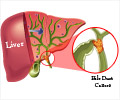While the incidence of intrahepatic cholangiocarcinoma (ICC) is increasing worldwide, its prognosis remains very poor.
While the incidence of intrahepatic cholangiocarcinoma (ICC) is increasing worldwide, its prognosis remains very poor.
Thus, further studies on its clinical characteristics for early detection and on surgical treatment for better prognosis are urgently needed.A research team from China retrospectively evaluated 5311 liver cancer patients who received resection between October 1999 and December 2003. Of these, 429 (8.1%) patients were diagnosed with ICC, and their clinicopathological, surgical, and survival characteristics were analyzed. Their study will be published on December 21, 2009 in the World Journal of Gastroenterology.
Their research demonstrated that hepatitis B infection, carbohydrate antigen 19-9 (CA19-9), carcinoembryonic antigen (CEA), and a-fetoprotein (AFP) are associated with ICC development. CA19-9 levels are associated with lymph node metastases, but inversely with cirrhosis. Radical resection (R0) is the key prognostic factor for ICC. Future studies should focus on evaluation of the molecule-targeted therapy, and whether it can efficiently control this deadly disease so as to improve the survival of the patients.
Source-Eurekalert
RAS










